AI Agents in Action: How Enterprises Can Operationalize Autonomous Intelligence Across Workflows
June 30, 2025
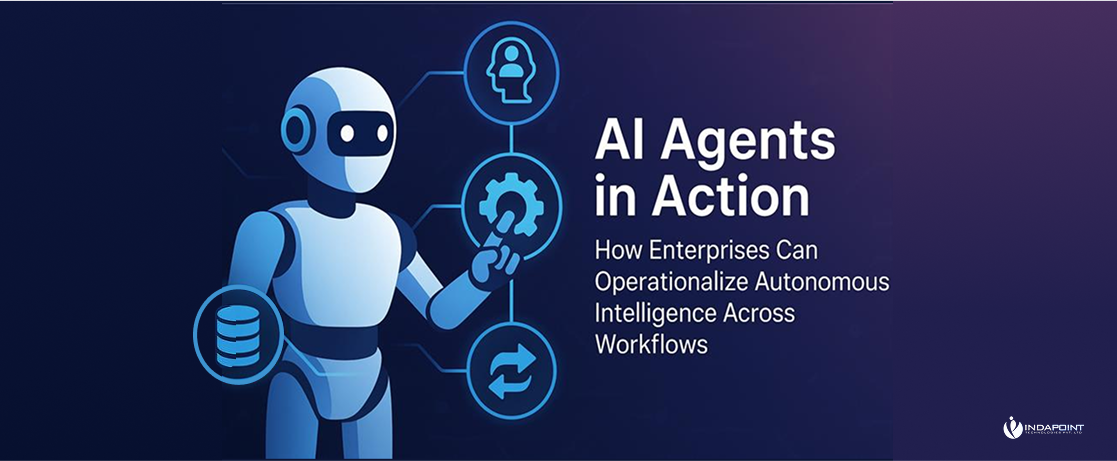
AI agents are transforming enterprise automation with agentic AI and multi-agent systems. From RAG chatbots to Claude agents and orchestration layers, they streamline enterprise AI workflows. Businesses can now build no-code AI tools, accelerating their business AI strategy. Operationalizing these tools empowers scalable, intelligent automation across finance, IT, and customer service—marking a new era in enterprise AI.
AI Agents in Action: How Enterprises Can Operationalize Autonomous Intelligence Across Workflows
In the ever-evolving landscape of artificial intelligence, a new frontier has emerged: AI agents. These are not just tools or models but autonomous, goal-driven systems that sense, reason, plan, and act within enterprise environments. Unlike traditional AI models that passively respond to inputs, AI agents actively pursue objectives, adapt to changing conditions, and even collaborate with other agents or humans. For CTOs, tech leads, and business stakeholders, this represents a paradigm shift in how AI is deployed and scaled.
What is an AI Agent?

At its core, an AI agent is a system that can:
- Receive goals or tasks from a human, another AI, or an orchestration system
- Interpret the environment using real-time data (sense)
- Use memory (short-term and long-term) to contextualize its actions
- Employ tools like web interfaces, code execution, databases, or APIs
- Exhibit traits such as reasoning, planning, acting, learning, adapting, and delegating
In essence, AI agents move beyond static inputs and outputs to become dynamic systems capable of making real-world decisions. For example, an AI agent managing IT incidents might detect anomalies, investigate logs, propose solutions, and even resolve issues autonomously—all while updating stakeholders in natural language.
AI Agents vs. Agentic AI: Clarifying the Debate
The terminology around AI agents can be confusing. In 2024, the industry generally referred to autonomous systems as “AI agents.” But by mid-2025, a stricter view emerged: only fully autonomous systems should be labelled as “Agentic AI.”
- AI Agents (2024 definition): Systems that act with some autonomy but may rely on human oversight
- Agentic AI (2025 definition): Systems that act independently across tasks, dynamically deciding how to proceed without external control
Enterprise Takeaway: Don’t get bogged down in semantics. Whether you call them AI agents or Agentic AI, what matters is the increased autonomy and utility these systems provide.
Core Traits of AI Agents in Enterprise Context
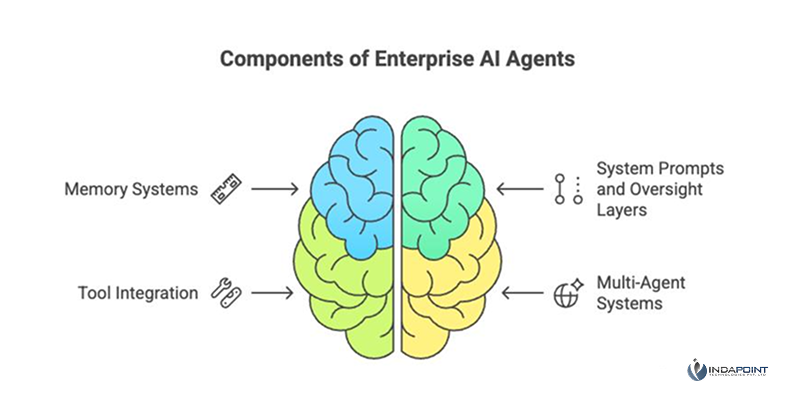
- Reason & Plan: Agents can formulate strategies to meet high-level goals.
- Act: They perform actions such as querying APIs, sending emails, and updating records.
- Learn & Adapt: Through reinforcement or episodic learning, agents improve over time.
- Delegate: Agents can invoke sub-agents or tools to handle specialized subtasks.
These traits make agents ideal for complex, multi-step enterprise workflows.
Key Technologies That Power Enterprise AI Agents
- Memory Systems: Agents require both short-term memory (working memory) and long-term memory (vector databases, SQL systems, file stores) to contextualize their decisions.
- System Prompts and Oversight Layers: Enterprise agents often operate under a system prompt—a structured set of rules or objectives defined by a human or orchestrator.
- Tool Integration: Agents can access web resources, run code, interact with applications, perform data analysis, or trigger backend functions (via MCPs or APIs).
- Multi-Agent Systems: Lead agents delegate tasks to specialized subagents, forming a distributed intelligence system.
Use Cases: Where AI Agents Add Value in the Enterprise
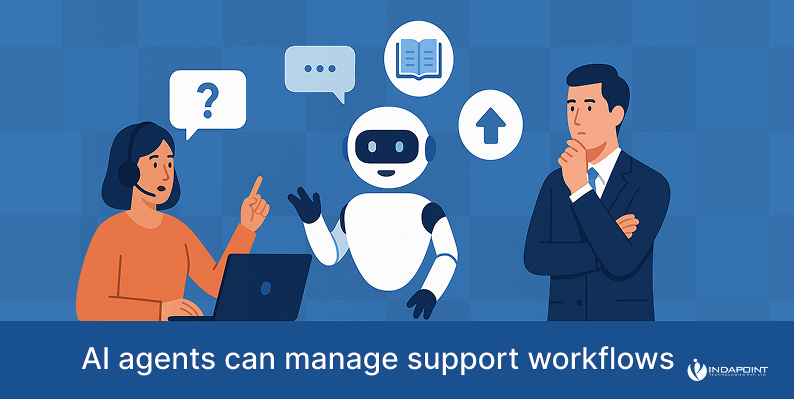
1. Customer Support
AI agents can manage entire support workflows:
- Understand customer issues
- Retrieve relevant knowledge articles
- Generate responses
- Escalate only when human judgment is needed
Example: A SaaS company deploys a customer service agent that autonomously resolves 80% of tickets and escalates the rest with full context to human agents.
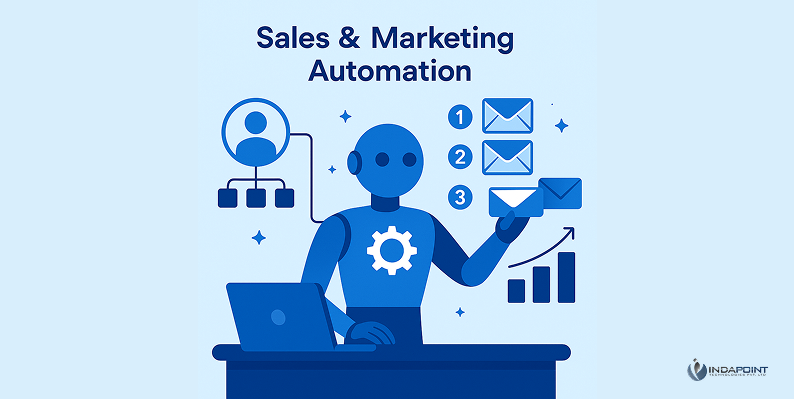
2. Sales & Marketing Automation
Agents can:
- Qualify leads by interacting with CRM data
- Generate personalized email sequences
- Adapt messaging based on engagement signals
Example: A B2B firm utilizes AI agents to execute outbound campaigns, resulting in a 35% reduction in lead conversion time.
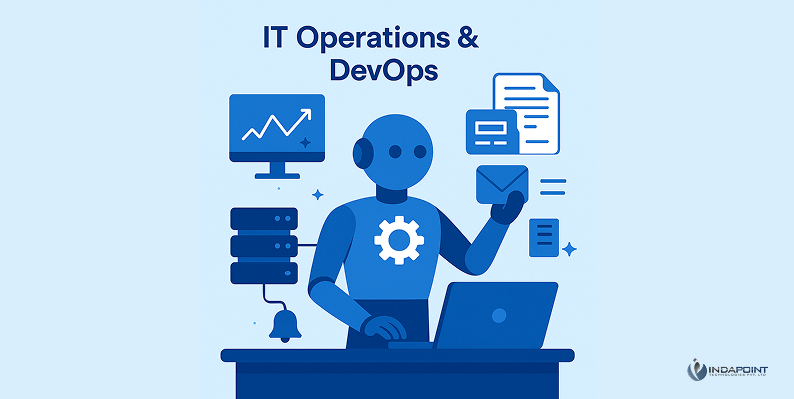
3. IT Operations & DevOps
AI agents can proactively manage infrastructure:
- Monitor systems
- Trigger remediation scripts
- Open tickets or notify stakeholders
Example: An e-commerce enterprise uses agents to detect and mitigate DDoS attacks, reducing downtime and alert fatigue.
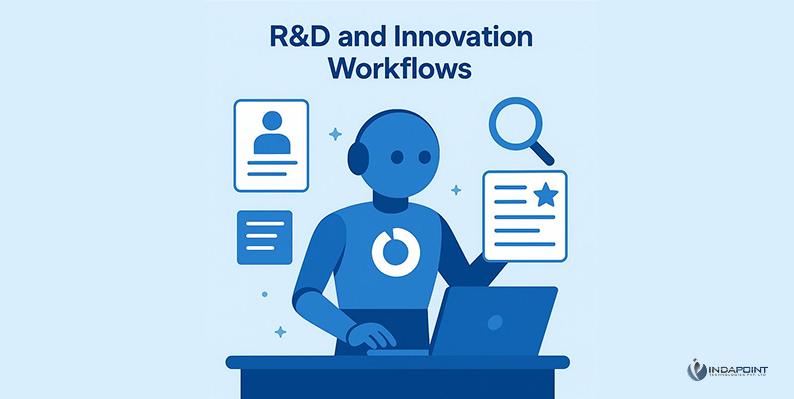
4. Finance and Procurement
Agents can:
- Reconcile invoices
- Flag anomalies in spending
- Generate monthly reports
Example: A logistics company automates its monthly procurement reviews through agent-led data analysis.
5. R&D and Innovation Workflows
AI agents assist in:
- Literature reviews
- Competitor tracking
- Research summarization
Example: A pharmaceutical company leverages agents to review recent research papers, summarize clinical findings, and recommend following research directions.
Building AI Agents: Frameworks and Approaches
RAG (Retrieval-Augmented Generation)
RAG agents use internal knowledge retrieval systems to ground their outputs, improving accuracy and relevance.
Claude Multi-Agent System
As illustrated in the shared infographic, Claude’s ecosystem supports lead agents delegating tasks to specialized subagents, such as search or citation handlers. This structure mirrors enterprise team dynamics.
Agent Architectures
Enterprises can architect agents using orchestration layers that:
- Route tasks based on type or priority
- Coordinate across multiple agent instances
- Monitor outcomes and adjust prompts dynamically
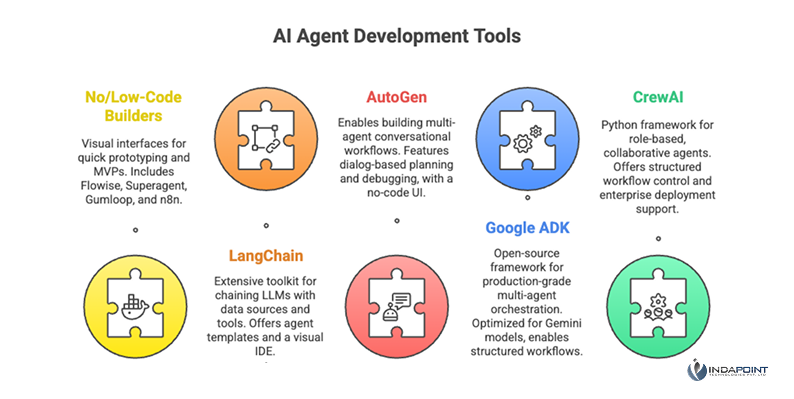
Getting Started: NoCode, LowCode & FrameworkBased Agent Development
Today, anyone can build powerful AI agents without needing a PhD or heavy infrastructure. Here’s a streamlined overview of the available tools, organized by sophistication and control: Start with no and low-code builders like Flowise, Superagent, Gumloop, and n8n if you want to prototype quickly via visual interfaces ideal for fast experimentation and MVPs.Suppose you’re comfortable coding (mainly in Python). In that case, LangChain offers an extensive toolkit for chaining LLMs with data sources, tools, and retrieval components, plus agent templates, observability, and a visual IDE via LangGraph and LangSmith.
Meanwhile, AutoGen enables you to build multi-agent conversational workflows, with Deep integration of dialog-based planning and debugging—AutoGen Studio even offers a no-code drag-and-drop UI for constructing and testing agent workflows.
For production-grade multi-agent orchestration at scale, turn to Google’s Agent Development Kit (ADK)an open-source, modular framework designed to feel like software development. Optimized for Gemini models but model- and deployment-agnostic, ADK enables structured workflows (Sequential, Parallel, Loop), agent hierarchies, tool integrations (search, code execution, connectors), performance evaluation, and deployment via Vertex AI Agent Engine or Cloud Run. Developers praise its CLI and debugging flow as smooth and developer-first.
Finally, CrewAI offers a clean middle ground: a standalone Python framework with both code-based and visual (Crew Studio) interfaces. You define agents in “crews” with specialized roles, tasks, and tools, while CrewAI’s Flows layer provides structured workflow control and conditional logic. It also includes tracing, observability, performance dashboards, and enterprise deployment support.
| Framework | Who It’s For | Strengths |
|---|---|---|
| Flowise, Superagent, Gumloop, n8n | Visual prototypers | No code needed, ideal for rapid prototyping |
| LangChain | Python/JS developers | Flexible toolkit, large ecosystem, robust agent templates & tooling |
| AutoGen (+Studio) | Conversational agent builders | Multi-agent chat workflows, planning logic, debugging via UI |
| Google ADK | Enterprise multi-agent builders | Structured orchestration, integrations, evaluation, scalable deployment |
| CrewAI | Role-based, collaborative agents | Crews and Flows orchestration, enterprise monitoring, no/lowcode options |
Challenges to Consider
Security & Compliance:Agents accessing live systems must be governed by RBAC and logging mechanisms.
Agent Drift:Unsupervised agents may deviate from desired outcomes—regular prompt tuning is essential.
Cost Management:Long-running or overly autonomous agents can trigger unnecessary API calls or compute usage.
Future Outlook: The Rise of Autonomous Enterprise Systems
By 2026, AI agents will be embedded across nearly all operational layers:
- Executive agents will synthesize business reports
- HR agents will conduct first-round interviews
- Legal agents will draft contracts and review compliance
The enterprise of the future is orchestrated, not operated. Leaders who begin investing in agent-based architectures today will gain a strategic edge.
Conclusion
AI agents represent a leap forward from passive AI tools to proactive, adaptable, and autonomous systems. Whether managing customer queries, optimizing cloud costs, or accelerating research, they unlock unprecedented efficiency and scale.
Ready to transform your enterprise with AI agents? Partner with a leading AI development company to implement agentic AI, RAG chatbots, orchestration layers, and enterprise AI workflows. From no-code AI builders to Claude agents and multi-agent systems, our AI solutions empower your business AI strategy. Contact us to accelerate intelligent automation across IT, finance, and customer service.




